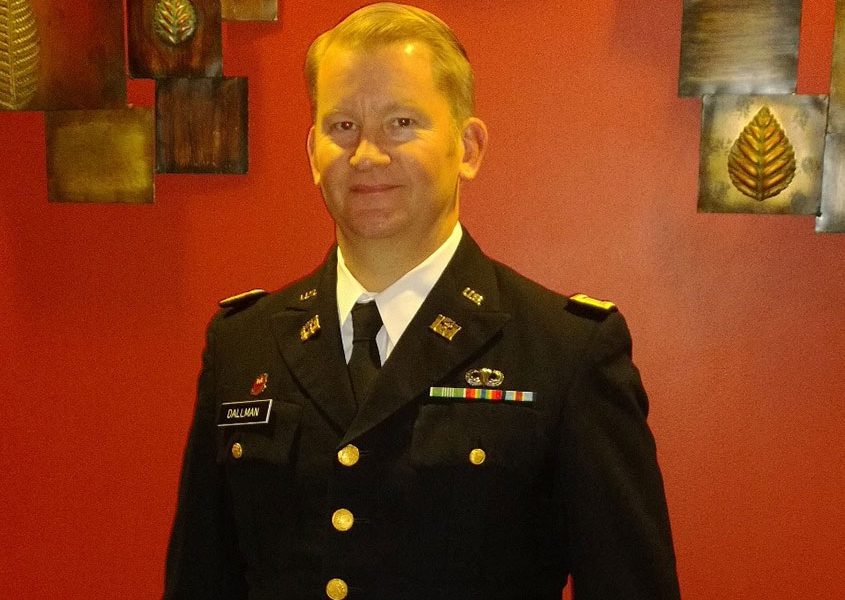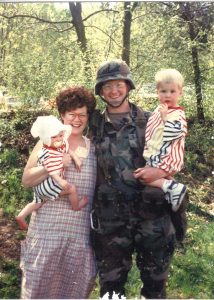Four generations of military service lends perspective to civilian career at Microsoft

Ask most veterans about how the service prepared them for a civilian career and the answer invariably involves values — the military ethic of discipline, integrity and the mindset to accomplish the mission that remains with vets for the rest of their lives.
For Microsoft’s Bill Dallman, it’s a concept that might be four times as relevant — A software asset manager working for the Small, Midmarket Solutions & Partners group in the Midwest, Dallman is also a fourth generation Army officer.
Dallman Germany Bill Dallman is a fourth-generation service member, and his son, an Army captain, is carrying on the family tradition.
Imagine growing up with a three-star general as your family patriarch. Dallman’s grandfather graduated from West Point, class of 1924 and put in 46 years of service. His dad and uncle were plebes once too — Dad graduated in 1945, put in 23 years and retired as a lieutenant colonel. Dallman’s uncle was part of the Class of 1964, served 30 years and retired as a full-bird colonel.
Before them all was his great uncle, who ran the Virginia Military Institute in the 1920s. Today, Dallman’s son is an Army captain, carrying on the family tradition and allowing his dad to live the military life vicariously.

How has all that military blood shaped Dallman’s outlook? At the top of the list is that famous military ethic: “I grew up an Army brat, in an Army household,” he says. “The values that are instilled as part of that history — duty, honor, country, integrity — are what I still live with today.
Dallman received his commission on a four-year ROTC ride at the University of Illinois, and served in Germany with the 3rd Armored Division as a combat engineer. After the Berlin Wall fell, he moved to the reserves in the early 1990s and retired in ’03 as a captain.
Like all vets, Dallman had to undergo the transition to civilian life where things work a little differently. “When I originally got out as an engineer, I worked for an engineering construction firm,” he says. “It was interesting because in the Army as a combat engineer you don’t really do any construction. You mainly blow stuff up.
In the mid-1990s, Dallman moved into the technology industry and held jobs with various solution partners of Microsoft. It was during that time that he got a sense for the company and its culture, work ethic — and values that remind him of what he grew up with at home.
“Microsoft hires self-starters,” Dallman says. “This company hires people who have experience, who have leadership, and who don’t need someone looking over their shoulder. Give them a mission, and get it done.”
Even though he lives in the Midwest, Dallman encourages vets at Microsoft HQ in Washington state to attend events and participate in the military community. With high-ranking flag officers — generals and admirals — coming to the campus to speak, along with the We Still Serve community for ex-military employees, Dallman says he’s continually impressed by the way Microsoft reaches out to and supports the veterans in its ranks.
“If I’d known just how good Microsoft was back in the mid-1990s, I probably would have tried to make the transition sooner,” he says. “Not only is Microsoft a very good company in general, but the more I find out about it in terms of its military community and the programs it supports, it’s just tremendous.”
According to Dallman, Microsoft’s practice of embracing veterans is a win-win for the company that pays off with each vet’s unique experiences and those time-honored military values. His own experience in the military has given him skills in leadership and dealing with people that are still helping him get the job done today.
“I love bridging that gap between the clients and my peers who might be more technology-focused,” he says. “That’s the whole Microsoft team concept. You’re not an island. You’ve got goals and responsibilities to achieve, but you’re part of a team.”
